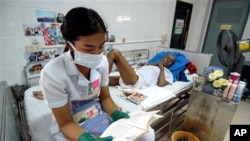The United Nations says some Asia-Pacific governments are legally obstructing the rights of people living with HIV as well as those at higher risk of becoming infected.
The U.N. body says laws against same-sex relations and that consider drug addicts and sex workers to be criminals undermine prevention and treatment programs, putting more people at risk of infection.
UNAIDS, the United Nations program on HIV/AIDS says 90 percent of countries in the Asia-Pacific region have laws and practices that act as barriers to HIV prevention and treatment.
Despite numerous efforts at education in the 30 years since the virus first appeared, 19 countries still criminalize same-sex relations and 16 restrict travel for those infected with HIV, the virus that causes AIDS.
Many Asian nations also outlaw sex workers and punish drug addicts rather than focusing on sex education and drug treatment.
The head of UNAIDS, Michel Sidibe, said in Bangkok Wednesday those laws violate peoples’ rights, lead to increasing numbers of HIV infections, and need to be changed.
"To make laws not just punitive but make laws protecting people,” Sidibe said. “Not creating an environment which will make people going underground and hiding themselves and not having access to services."
For example, Sidibe says, in Thailand, where prostitution is illegal but tolerated, HIV infections among sex workers doubled in the past five years.
Jon Ungphakorn, a former Thai senator and prominent AIDS activist says although Thailand provides universal access to antiretroviral drugs to treat HIV, the policy applies only to Thai citizens.
"We have over two million migrant workers,” Ungphakorn said. “They don’t have access to antiretrovirals. Refugees don’t have [access]. And, although prisoners do have [access], but these are prisoners who have Thai nationality only. We have [a] large number of prisoners who don’t get access to antiretrovirals."
However, Thailand has earned international praise for its efforts to contain AIDS and increase the use of condoms. A strong government effort starting in the 1990s dramatically cut the nation’s infection rate.
AIDS experts, policymakers, and activists gathered in Bangkok Wednesday for a meeting of the U.N.’s Global Commission on HIV and the Law.
The two-day meeting is the first in a series of regional dialogues debating legal and social restrictions to HIV prevention and treatment.




